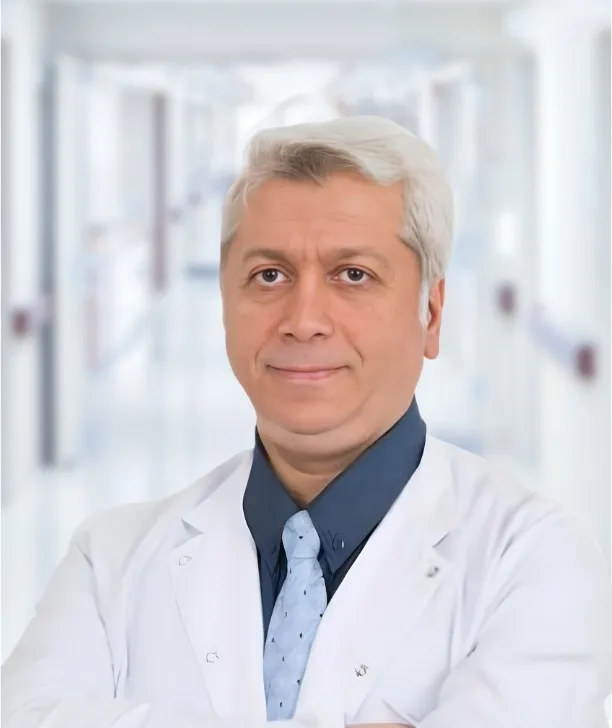- 3000+ Radiotherapy
- 2500+ Chemotherapy
- 2000+ Phytotherapy
- 40+ Publications
Dr. Murat Radiation Oncology Specialist
Dr. Murat graduated from Istanbul University Faculty of Medicine in 1999 and completed his specialization in internal medicine and subspecialty training in medical oncology at the same institution. He gained advanced expertise in radiation oncology while working at Istanbul University Oncology Institute, contributing to targeted radiation therapies, immunotherapy, and chemotherapy applications.
Combining conventional medical treatments with complementary therapies, Dr. Murat provides holistic care to cancer patients. He integrates phytotherapy, ozone therapy, and evidence-based natural approaches to improve patient well-being. He also completed observer training at the Scripps Proton Therapy Center in San Diego, USA, and has contributed to numerous national and international scientific publications and conferences.
Dr. Murat is known for his patient-centered, multidisciplinary approach—bridging modern oncology with complementary therapies to offer comprehensive cancer care.
Specialized Procedures
Professional Experience
-
Doctor of Medicine (MD) | (1999)
Istanbul University Faculty of Medicine -
Specialization Training | (Istanbul University)
Internal Medicine -
Subspecialty Training | (Istanbul University)
Medical Oncology -
Oncology Institute Experience | (Istanbul University Oncology Institute)
Advanced work in radiation oncology; targeted radiation therapies, immunotherapy, and chemotherapy applications -
Observer Training | (Scripps Proton Therapy Center, San Diego, USA)
Proton therapy exposure and advanced radiation oncology practices -
Holistic Cancer Care | (Ongoing)
Integrates conventional oncology with complementary therapies (phytotherapy, ozone therapy, and evidence-based natural approaches) -
Academic & Scientific Contributions | (Ongoing)
National and international publications and conference presentations
Hotel Accommodation Gallery





Hospital & Clinic Facility Gallery







Patient Testimonials
International Patient Reviews for Radiation Oncology Specialist in Istanbul
Frequently Asked Questions
Breast, prostate, lung, head & neck, brain, rectal/anal, gynecologic, and metastatic sites using modern radiotherapy. He also coordinates chemotherapy, targeted therapy, and immunotherapy within a multidisciplinary plan.
IMRT/VMAT, IGRT (image-guided), SBRT/SRS (stereotactic), 3D-CRT, and brachytherapy where appropriate—planned with CT simulation and strict quality assurance for accuracy.
Consultation → CT simulation (sometimes MRI/PET fusion) with comfortable immobilization → target & organ-at-risk contouring → physics planning & verification → daily treatments with imaging guidance.
Most effects are temporary and site-specific (fatigue, skin redness, mild swallowing/urination changes). Late effects are uncommon and minimized by precision planning. You receive written prevention and skin-care guidance.
You lie on the treatment couch, the machine rotates around you, no pain and no radiation remains in the body. Sessions typically last 10–20 minutes.
Depends on diagnosis: SBRT/SRS: 1–5 sessions; many curative courses 15–30 sessions on weekdays. Short-course options may be available after evaluation.
Yes, when indicated. Chemoradiation is common for rectal/head-neck cancers; hormonal/targeted drugs may be sequenced with radiation for prostate/breast; immunotherapy can be integrated case-by-case.
For breast we may use DIBH to reduce heart dose; for prostate we use daily image guidance and tailored bladder/rectum preparation protocols to protect healthy tissues.
Nutrition, pain management, skin and mucosal care, physiotherapy, and psychosocial support. Complementary options (e.g., evidence-informed phytotherapy/ozone as supportive care) are never a substitute for standard oncology and are used only when appropriate.
SBRT/SRS: plan 5–7 days total.
Standard courses: plan 3–6 weeks stay (weekdays only).
We can arrange airport–clinic transfers, nearby hotels, and translation.
Standard courses: plan 3–6 weeks stay (weekdays only).
We can arrange airport–clinic transfers, nearby hotels, and translation.
 English
English
 Spanish
Spanish  Russian
Russian  Portuguese
Portuguese  Italian
Italian  Polish
Polish 

